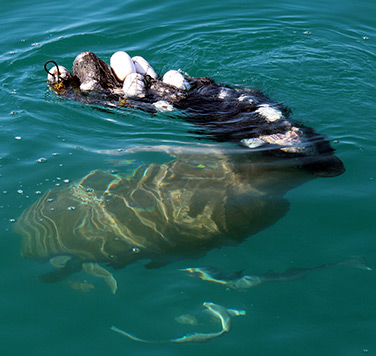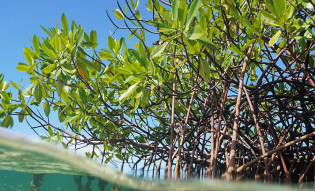Rare Dugong Rescued by ADNOC Team After Becoming Entangled in Illegal Fishing Net

In a three-hour long rescue operation, the joint ADNOC/SBGS team of environmental specialists set the 1.5 meter long marine mammal free after the fishing net, with multiple attached floats, had become entangled around the Dugong’s tail, preventing it from diving and grazing on sea grasses, its staple food.
When rescuers found it, the distressed Dugong was exhausted due to its efforts to free itself from the net. Before the rescue operation, the ADNOC and SBGS teams had been conducting wildlife line transect surveys in the area. The surveys are used to estimate wildlife distribution and abundance in a specific location and to provide real-time environmental monitoring during marine seismic operations.
Abdulla Al Marzooqi Manager, HSE Unit at ADNOC said: “Biodiversity and ecosystem services are important for society, and we work to protect them across our operations and throughout the life of our assets. ADNOC also takes a proactive approach towards marine development and has a portfolio of marine environment enhancement projects across the Emirate of Abu Dhabi.
“Rogue fishing gear and marine debris is a serious issue and is responsible for the deaths of countless marine mammals globally. Throughout the surveys we conduct, a significant effort is made to recover any floating garbage and rogue fishing equipment.”
To help identify the animal in the future and monitor its movements, the environmental team marked it using non-toxic lead-free paint marker. They were also able to record, for the first time, the sounds of a Dugong in distress. It is hoped these recordings can be used to monitor Dugong communications in the future to ensure ADNOC’s offshore operations are not causing trauma to any nearby Dugongs.
News of the successful rescue comes as delegates, from 23 of the 40 countries that are home to the Dugong, came together in Abu Dhabi to find better ways to protect the animals. The delegates’ meeting kicked off a week-long series of events in the UAE’s capital to focus global attention on the need to protect the Dugongs and their seagrass habitats, and empower governments, researchers and local communities to work on conservation projects.
A relative of the elephant, Dugongs are the only herbivorous marine mammal in the world, feeding almost solely on sea grasses. While the Arabian Gulf is believed to be home to the second largest population of dugongs on the planet, the International Union for Conservation of Nature and Natural Resources lists the dugong as a species vulnerable to extinction, while the Convention on International Trade in Endangered Species limits, or bans, the trade of derived products.
Despite being legally protected in many countries, the main causes of population decline among Dugongs include fishing-related fatalities, habitat degradation and hunting. With its long lifespan of 70 years or more, slow rate of reproduction, and largely coastal habitat, the Dugong is especially vulnerable to these threats.







.ashx?h=748&w=1000&hash=23B79F2DEDB1AEAC75968BDB7A78AB66)




